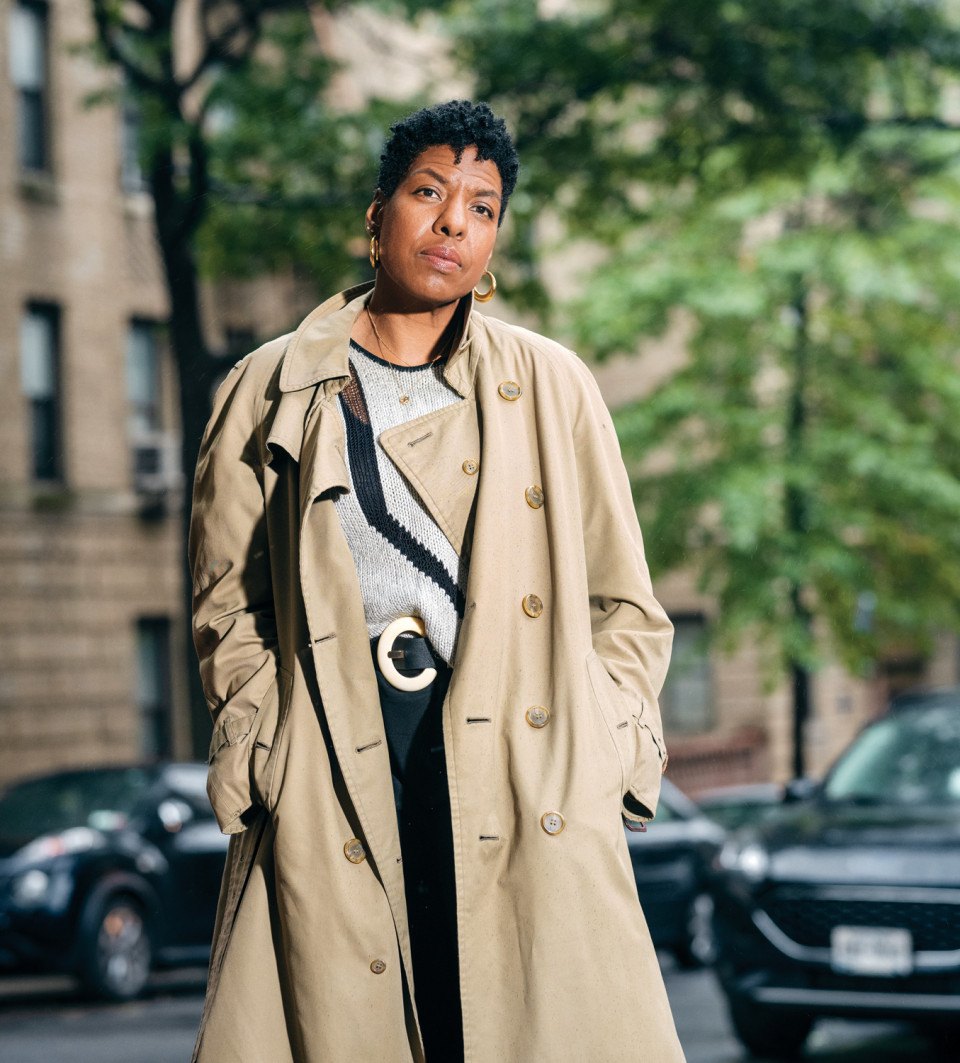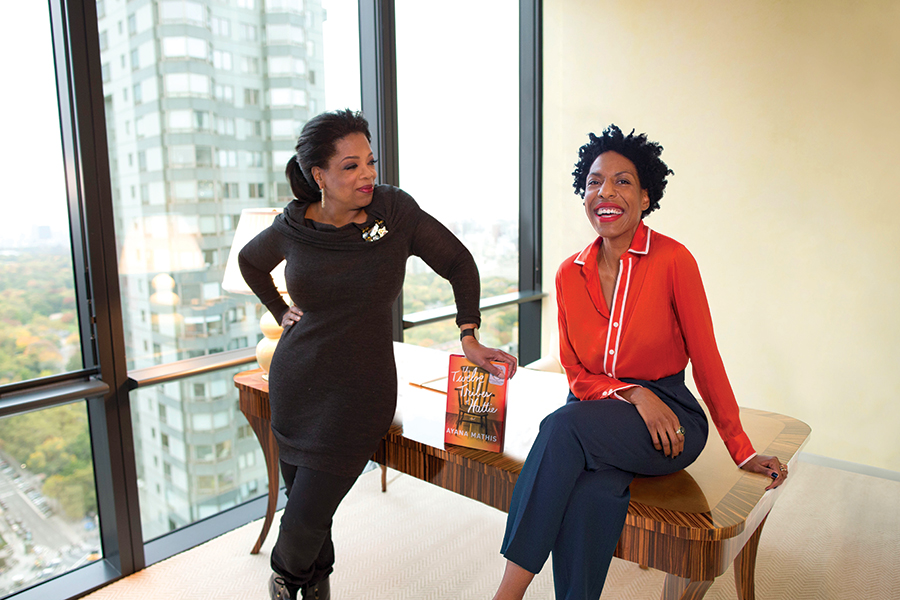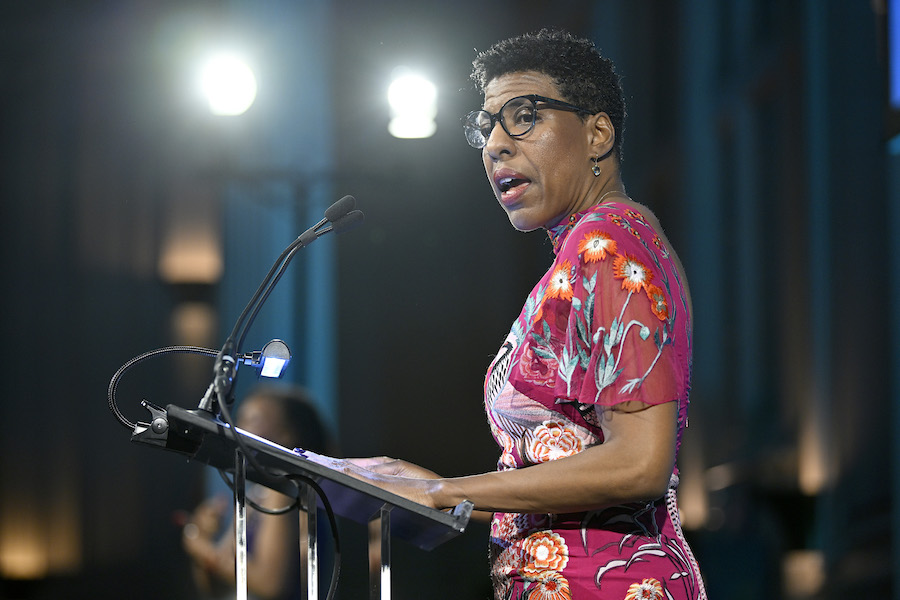Ten Years After Oprah Book Pick, Philly’s Ayana Mathis Is Back
The early reviews are stellar for The Unsettled, which was partly inspired by the MOVE bombing.

Ayana Mathis / Photograph by Linette & Kyle Kielinski
In 2012, Germantown native Ayana Mathis suddenly found herself thrust into the spotlight when Oprah Winfrey singled out her debut novel for the famous book club. It’s taken a while, but Mathis just released her second novel, another work of historical Black fiction. Here, she talks about the MOVE bombing’s influence on the book, growing up poor, and the one thing from Philly she wishes she could import to New York City. We spoke with her on September 27th.
Good afternoon, Ayana.
Hi, Victor. What’s happening in Philly?
Interesting you should ask. Last night was a bit chaotic. Dozens of arrests for looting in Center City. On the other hand, the Phillies clinched a playoff berth.
[Laughs] I shouldn’t be laughing. But that is just so very Philly. Such a city of contradictions.
Indeed. Congratulations on the release of your second novel, The Unsettled. What does one do on the day of one’s major book release?
One paces around one’s apartment anxiously. [laughs]
I’m assuming that like most creative types I know who live in New York, you live in Brooklyn.
I do not! Ha! Sorry that I can’t perpetuate that for you. I used to live in Brooklyn; I’ve been in Washington Heights for seven years.
I’m not sure I’ve ever been to Washington Heights.
It’s the northern part of Manhattan. I’m on 180th Street, and the island ends at 220th Street. It reminds me of a New York that used to be. Just regular people and families, as opposed to the super-cool and the super-hip. It’s a real neighborhood. I mean, we still have a shoe-repair place! But I’m also right by the A train, so I’m only 25 minutes from Midtown.
Why did New York pull you away from us?
After graduating from Girls’ High, I went to NYU. I had what I would call a “varied” undergraduate career. After a year at NYU, I wound up with my mom back in Philly, because I was in an accident and needed to heal. Then I wound up at Temple, where I had the amazing fortune to study with the renowned poet Sonia Sanchez. And then back to New York again for more college. And then I just wound up staying here.
My students have big questions and strong opinions about why we are reading what we’re reading. But, I ask them, what is the point of completely erasing something? Why not debate it and loudly critique it as intelligent, thinking people? Just simply erasing things, as many people are doing, is a very big problem.” — Ayana Mathis
Do you still consider yourself a Philadelphian?
I do. When people ask me what my core identity is, all of these things come to mind, but, basically, I am a poor Black girl from Philly. That’s who I understand myself to be.
How poor are we talking?
Very. We had lots of housing instability. I grew up in Germantown and Mount Airy and, for a bit, on City Line Avenue in Wynnefield. But mostly in Germantown.
Without giving away too much of your book, MOVE and the bombing of MOVE provide major inspiration for some of the characters and part of the plotline. What was your experience with MOVE as a kid in Philly?
There was so much mystery surrounding MOVE. I was 11 when the bombing happened, and I saw what I saw on TV. But in my family, we just didn’t talk about it. I knew that there was something very wrong and that something fundamentally bad had happened. But in my house, there were just certain kinds of discussions that weren’t really had. Was it similar for you?
Yes. I remember watching it on TV. It was this horrible spectacle that nobody discussed.
I didn’t really “get” it. I carried it around as a wound, and it wasn’t until I was much older and in college, taking African American studies and reading African American literature and writings about protest movements, that I was really able to interrogate the dynamics of that time and to be able to talk about MOVE in a coherent way.
Only serious hardliners think there was any cause for Philly to bomb its own citizens. That said, a lot of people are quick to point out that MOVE was a terrible neighbor. There were guns in the compound and other factors involved. How does history judge MOVE and the actions of the city?
That’s a big and complicated question. I should say, for the record, that my book is not about MOVE. MOVE is an inspiration for things that happen in my book. But yes, it is 100 percent the case that the police should not have done what they did, and it was also the case that MOVE were bad neighbors. The question becomes: In a civil society, what do we do when neighbors have legitimate complaints about a neighbor? Certainly, the response is not that we bomb the bad neighbor. Was MOVE a menace? Yes. But being a menace doesn’t mean you should be murdered.
MOVE also had perfectly valid points about the “system” and Black autonomy. What do we do with people who decide to live outside the system as separatists? And what are the challenges those people face from within and without? MOVE should inspire in us mourning, outrage, and a whole lot of questions about how the state and the powers that be meet Black people — or any other people — who want to live differently.
Some of the Philly authors I’ve interviewed publish a book a year. Your first novel, The Twelve Tribes of Hattie, came out 11 years ago, to great acclaim. Did you take a long break after Hattie? Or did you just take it slowly?
I did take my time, that’s for sure. But I didn’t intentionally take a break. Hattie was such an intense whirlwind, mostly because Oprah chose it for her book club. So after it came out, I was touring off and on for two years, all around the world. The whole experience was so loud and shocking that it required a recalibration of my self — my relationship to writing and to my privacy. And then once I was ready, yes, there was a lot of: I like this sentence, I don’t like this sentence, this character works, this character doesn’t. The Unsettled was also just a very difficult book to write, very different from Hattie. It required an entirely different set of tools and style of narration. It was a recalcitrant book that took a long time to gel and become itself.
And are you wholly satisfied with the results, or did there come a point where your publisher said, “Okay, enough. You need to turn this in”?
I was way past my deadline. This book was literally three or four years late. But thank God, my editor was like, “I just want it to be a good book, so when we’re done, we’re done.” I am happy with it. I think every book is always this idealized thing in your head, this shining jewel that exists in your mind, but you can never actually make or fully realize that thing. So is it the thing in my head? No. No, it is not. Nothing I write will ever be. But I am so proud of it.
So will I need to wait until 2034 for your third novel? My kids will be 27 and 28 by then, Ayana.
You’ll be going to weddings!
Don’t say that.
[Laughs] I know, right? In our very East Coast bubble, people get married in their 30s. Even though it’s a perfectly valid decision to marry in your mid-20s, it does seem strange these days to some of us. … But no, I don’t think it will be that long. A sophomore novel is notoriously difficult to write, and even more so when reception to the first novel was what it was for Hattie. I know nothing about what that third book will be, but I hope it doesn’t take that long, nor do I think it will.
How has the book industry changed since Hattie?
It’s changed so much. Things are so fragmented. Cultural information now comes from so many different sorts of sources, and it’s increasingly siloed, with the algorithm dictating what you find out about. So it will be interesting for me to see how this one rolls out.

Oprah Winfrey with Ayana Mathis at the O Magazine offices at the Hearst building in 2012. / Photograph via O, The Oprah Magazine/Rob Howard
You mentioned growing up poor. Then you write this novel that becomes part of Oprah’s Book Club and stays on best-seller lists for months. Did this have a big impact for you financially, or are you like some of my friends who have millions of Spotify streams but can’t pay their rent?
It had a very intense economic impact on my life. Not as much as some people thought. When I was on tour, I would encounter people who thought I was a sudden millionaire. That was not at all the case. But the impact was certainly significant.
As for the sales of The Unsettled, clearly people are buying fewer books than they used to.
Booksellers definitely sell fewer books, but even when Hattie came out, people were saying books and publishing were dead. But that’s not true. We see so many independent bookstores opening and thriving, and we see a lot of people out there on social media with huge followings advocating for books just because they love them.
I also recall when e-books were supposedly going to wipe out physical books. But that hasn’t happened by any means. My kids refuse to read books digitally. They want to hold actual paper in their hands.
Yes, I think there may be a rebellion against digital from younger millennials and Gen Z. This is anecdotal, but it seems to me there’s a pushback from those people against their lives being hijacked by digitized everything. I see young people every day on the subway reading physical books, and it’s refreshing.
But at the same time, when I’m out to dinner in nice restaurants, I see so many parents sticking iPads in their kids’ hands and headphones in their ears during dinner.
I know! Parents are going to ruin everything. [laughs]
I find that there are two types of artists — those who never read reviews, and those who claim they don’t but secretly do. Which are you?
I totally read the reviews. Can’t help it. I also write book reviews for the New York Times, and I find reviews to be a really interesting form of writing. Actually, as we sit here right now, I am anxiously awaiting the Washington Post’s review of Unsettled. That said, I don’t pay attention to the reviews on Goodreads or Amazon. That’s just too much, too overwhelming.
Both of your novels heavily incorporate Black history. But neither includes more modern Black history, like the history since you became an adult. Do you ever see yourself incorporating, say, Black Lives Matter or the murder of George Floyd?
I write historical novels, but it’s really kind of impossible for me to write a novel where I have to contend with social media or cell phones, so I want to stop everything by 1990. So many things that happened back then can’t happen now thanks to cell phones — or at least, they would happen very differently. I am very analog, at least when it comes to my fiction.

Ayana Mathis, author of the new book The Unsettled, speaking at the Literacy Partners 2023 Gala in New York (Getty Images)
You write book reviews. I occasionally step into the fray of cultural reviews in my writing. But I was just involved in a social media fracas where a bunch of people — people younger than me — were arguing that professional critique has no place in society today. What’s your read on that?
There is a generational difference here. There’s some justifiable distrust there in the sense that for years, there were gatekeepers who would decide what would get in and what wouldn’t, and these gatekeepers weren’t representative of the community. We’re also now a ratings culture, where everybody wants to say who has the best french fries, and thanks to all the apps, they can do that. This chips away at professional reviewing. But I am hoping that as the gatekeepers change, which is happening slowly, there will be more respect for critique.
Back to Girls’ High. So many women I’ve talked to have raved about their experiences at Girls’ High. The one that stands out the most is Gloria Allred, who said she wouldn’t be who she was without Girls’ High. Actually, I’ve never heard one bad thing about Girls’ High, which seems weird. What was your experience?
I’m sorry, but I’m not going to disrupt the narrative. [laughs] It was great. Girls’ High was a haven for me at a time when my life outside of school was tumultuous. When I was there in the late ’80s, there was a real inattentiveness in society to the feminist issues playing out in classrooms. In 1987, nobody was thinking about the fact that the boys were always the ones who spoke out the loudest and who were allowed to speak for the longest. But at Girls’ High, the people to speak the loudest and longest were all girls. The sports stars were all girls. Those four years really changed my sense of self and my confidence.
I know you teach at Hunter College. So much has been said lately about free speech and academic freedom on campus. Buzz Bissinger not long ago revealed to me that he refuses to teach his biggest work in his writing course at Penn after a student raised holy hell because he used the N-word in it. Do you find the current academic environment limiting?
I’m very lucky. My students have big questions and strong opinions about why we are reading what we’re reading. But, I ask them, what is the point of completely erasing something? Why not debate it and loudly critique it, as intelligent, thinking people? Just simply erasing things, as many people are doing, is a very big problem.
We’re out of time, and I feel my editor staring at me and saying, “Make her say more about Philly!” After all, this is Philly Mag. So for this final question, I want to know what one thing from Philadelphia you wish you could import to New York.
Wider streets! And the fierce honesty and authenticity that you get from Philadelphians. But really, if you make me pick one thing, it would have to be the Reading Terminal Market, which I look forward to visiting again soon. A brisket sandwich with broccoli rabe and sharp provolone from DiNic’s is the thing I long most for.
This interview has been edited for length and clarity.
Published as “A Writer’s Return” in the November 2023 issue of Philadelphia magazine.


